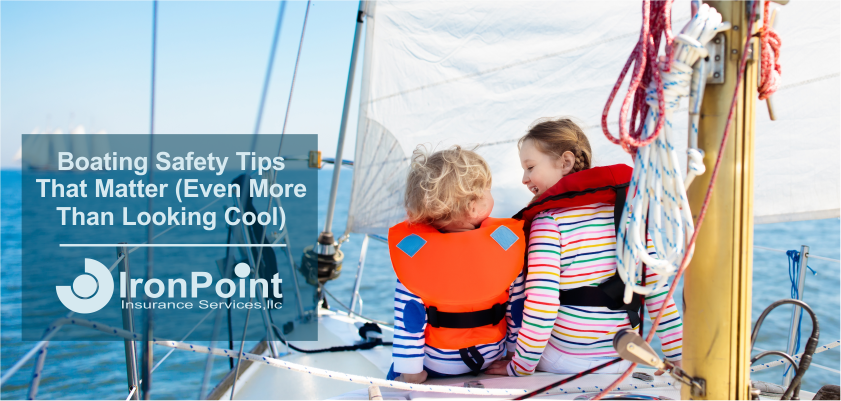Boating Safety Tips That Matter (Even More Than Looking Cool)

Boating safety tips won’t make you Instagram famous. They won’t get you a date. And they certainly won’t make you the life of the floating party.
But here’s the truth that 310,000 new powerboat owners are about to learn the hard way: the water doesn’t care about your social media strategy.
It’s your safety, not your socials we’re concerned with.
The Sexy Truth About Not Drowning
Want to know the most rebellious thing you can do on a boat this season?
Wear a life jacket.
I know. Revolutionary stuff. While everyone else is posting their “living my best life” shots with perfectly styled hair and conspicuously absent safety gear, you could be that weirdo actually planning to make it back to shore alive.
Here’s a statistic that doesn’t get printed on brochures: 86% of people who drown in boating accidents weren’t wearing life jackets. Let that sink in (poor choice of words, I know).
The cold, hard reality? Your swimming abilities mean absolutely nothing when you’re unconscious after hitting your head during an unexpected collision. Your CrossFit membership won’t help you stay afloat in cold water when hypothermia sets in.
Life Jackets: The Most Important Fashion Statement You’ll Never Make
The foundation of all boating safety tips begins with strapping on that bulky, unflattering life preserver. Here’s why they matter:
- Physics doesn’t negotiate: When you’re overboard, treading water becomes your full-time job. Life jackets turn this into a part-time gig.
- They work while you sleep: Unconscious swimmers aren’t swimmers at all. They’re sinkers.
- They’re visible from distances: That neon orange stands out a lot better than your trendy navy blue swim trunks in choppy water.
When choosing a life jacket (which, let’s be honest, most people spend less time selecting than they do picking a filter for their boat pics), consider:
- Proper fit: If you can pull it over your head while it’s buckled, it’s too loose to save your life.
- Activity appropriateness: Fishing, waterskiing, and general cruising all have specialized designs. This isn’t just marketing—it’s about range of motion when it matters.
- US Coast Guard approval: This isn’t a suggestion. It’s the difference between actual flotation and the illusion of safety.
The Boating Safety Tips Everyone Ignores (Then Regrets Later)
Beyond the life-saving fashion statement you’ll refuse to wear in photos, here’s what separates the survivors from the statistics:
Weather: It Doesn’t Care About Your Weekend Plans
That perfect Saturday you’ve been looking forward to all week? Mother Nature hasn’t checked your Google calendar.
Weather changes on water happen faster and hit harder than on land. The smart move:
- Check marine-specific forecasts (not just the general weather app)
- Know what different wind speeds mean for your specific boat size
- Understand that dark clouds on the horizon aren’t just photogenic—they’re warning signs
Thinking you’ll just “head back if it gets bad” is like saying you’ll just “drive slower if you get drunk.” By the time you realize you need to act, it’s often too late for good decisions.
Boat Maintenance: Not Just for Boat Nerds
Your boat is essentially a metal container keeping you from becoming fish food. Maybe treat it with some respect?
That means:
- Regular engine checks (because swimming from the middle of the lake isn’t as fun as it sounds)
- Electrical system inspections (since water and electrical fires go together like social media and bad decisions)
- Hull integrity verification (small cracks become big problems at precisely the worst moments)
Skipping maintenance isn’t carefree—it’s careless. And the water has no mercy for either.
Safety Equipment: The Stuff You Buy and Hope Never to Use
Most boaters approach safety equipment like teenagers approach condoms—they know they should have them but hope never to need them. Here’s what your boat needs:
- Fire extinguishers: Because boats combine fuel, electricity, and confined spaces in a spectacularly flammable trifecta
- First aid kit: Not the dusty one from your bathroom—a marine-specific one with waterproof components
- Communication devices: Because “my phone has 1% battery” isn’t a great last text
- Visual distress signals: Flares aren’t just for dramatic movie scenes—they’re for making sure your drama has a happy ending
Boating Rules: Not Just for Nerds and Cowards
The rules of the water weren’t created by joyless bureaucrats (okay, maybe some were). Most emerged from the collective “oh crap” moments of generations of boaters.
Master these or star in someone else’s cautionary tale:
- Right-of-way rules (hint: it’s complicated, and “I’m going faster” isn’t a factor)
- No-wake zones (because they’re not just about preventing your beer from spilling)
- Navigation markers (which are trying to tell you something important, like “rocks ahead”)
- Traffic patterns (because boats don’t have lane lines painted on the water)
Alcohol: The Tradition That’s Killing Boaters
Let’s be brutally honest: drinking while boating isn’t just illegal in most places—it’s Darwin Award material.
Consider:
- Alcohol is involved in one-third of all fatal boating accidents
- Sun exposure and wave motion amplify alcohol’s effects by up to three times
- Your ability to swim decreases dramatically with each drink (precisely when you might need it most)
Being the sober captain isn’t just responsible—it’s revolutionary in a culture that celebrates “boat drinks” as if they aren’t exactly the same as “car drinks.”
Next-Level Boating Safety Tips for People Who Like Living
If you’ve mastered the basics and want to graduate to “actually prepared” status, here’s your advanced curriculum:
Boating Education: Not Just for Beginners and Boy Scouts
Taking a certified boating safety course is like getting vaccinated against the most common forms of marine stupidity.
These courses cover:
- Regional hazards you won’t learn about on YouTube
- Emergency procedures that work better than panic
- Legal requirements that won’t care about your ignorance when violated
- Hands-on practice with equipment you might only need once (but really need)
Remember: The time to learn emergency procedures isn’t during an emergency.
The Float Plan Everyone Thinks Is Excessive Until It’s Not
Before leaving dock, tell someone responsible:
- Where you’re going
- When you’ll be back
- Who’s with you
- What your boat looks like
- What communication devices you have
This isn’t helicopter parenting for adults—it’s the difference between a rescue that starts in 30 minutes versus one that starts in 3 days.
The Designated Lookout: Your Boat’s Designated Driver
Having someone whose sole job is watching for hazards isn’t micromanaging—it’s acknowledging that the person controlling the boat can’t see 360 degrees simultaneously.
Rotate this responsibility so everyone stays sharp and no one misses all the fun.
The Uncomfortable Conclusion About Boating Safety Tips
Here’s the part no one wants to hear: Most boating tragedies aren’t accidents. They’re preventable incidents with predictable causes and predictable outcomes.
The truly radical position isn’t ignoring safety for the sake of “living in the moment.” It’s acknowledging that preparation doesn’t diminish fun—it makes more fun possible.
Because the goal isn’t just one great day on the water. It’s a lifetime of them.
And that YOLO philosophy everyone loves to quote? That’s exactly the point. You DO only live once. So maybe don’t throw it away for a good profile pic.
The Insurance Part (Because We Still Need to Sell Something)
All these boating safety tips lead to one inescapable conclusion: you need protection beyond just physical precautions.
The right boat insurance policy isn’t just paperwork—it’s peace of mind when the unexpected happens despite your best efforts. It’s the difference between a bad day and a financial catastrophe.
Whether you’re a new boat owner still figuring out which end is which, or a seasoned captain looking for better boat insurance coverage, we’ve got specialized policies for every type of boater.
Interested in a quote, call us to speak with an insurance professional who won’t judge you for actually caring about safety (well, not to your face, anyway).
Don’t like the phone, start the conversation online.
Let’s Get Started!

Want to know if you can save on boat or PWC insurance? See for yourself. Start a quote today.
Call today and speak with a professional insurance agent.